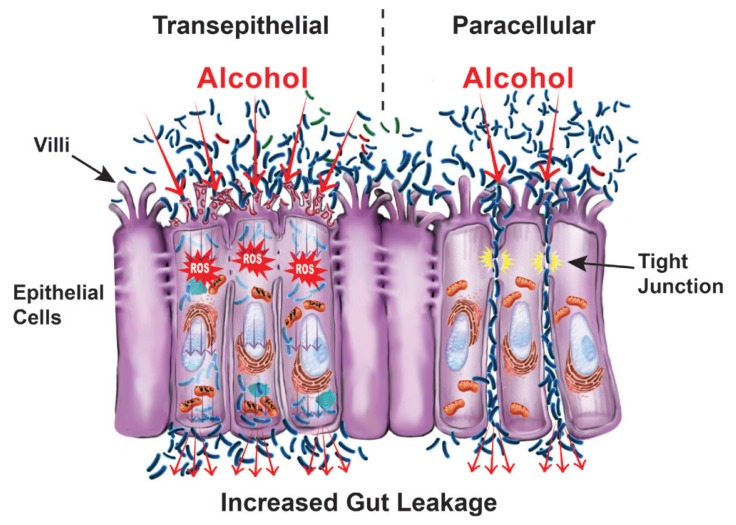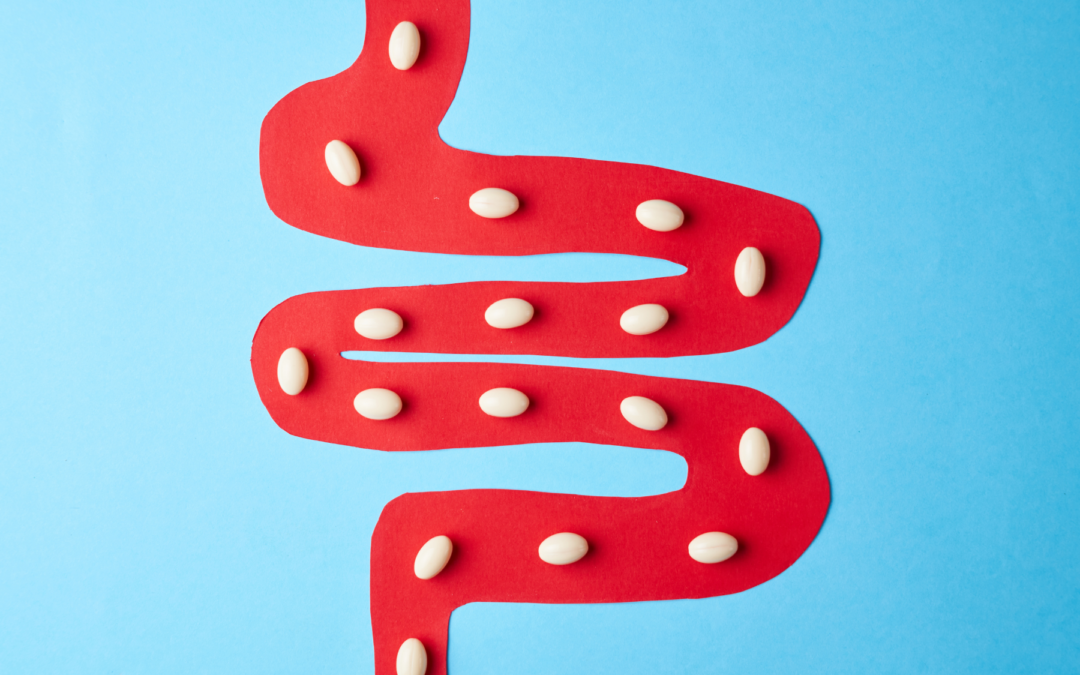We don’t want to be the bad guys here, but someone has to say it: alcohol harms your health. Researchers have discovered that alcohol, especially if consumed often and in larger amounts, causes inflammation throughout the body. The process begins in the gut, and it may be the root of multiple organ problems and chronic disorders such as chronic liver disease, neurological diseases, GI cancers, and inflammatory bowel syndrome (IBS). Today, we’re going to cover some of the ways that alcohol affects health.
How is Alcohol Digested?
To start, we should cover how alcohol is digested. Once consumed, alcohol dives into the stomach, where around 20% of the alcohol is absorbed. From there, it moves into the upper intestinal tract, where the other 80% is absorbed. Once absorbed into the bloodstream, it enters the liver through the portal vein. The liver is where most alcohol is then broken down to be removed from the body (1).
Although most of the alcohol is metabolized in the liver, the enzymes that break down alcohol also exist in the intestinal lining. Plus, bacteria living in the intestines break down alcohol into acetaldehyde, which is toxic. Alcohol can also be broken down in the intestines while interacting with membrane phospholipids (cell membranes) and/or free fatty acids. This pathway might be particularly important in the development of intestinal injuries after drinking alcohol (1).
How Does Alcohol Affect the Body?
It increases gut permeability & inflammation
Alcohol metabolism in the gut is what can lead to disruption of tissue balance and lead the body toward a chronic state of intestinal inflammation (1). Studies have shown that alcohol can change the bacterial composition in the gut, increase intestinal permeability, and disrupt the immune system within the intestinal mucosa (1).
Why is leaky gut a problem? Well, the gut lining covers more than 4,000 square feet of surface area. When it’s working properly, it forms a tight barrier only to allow certain nutrients into the bloodstream. A leaky gut with cracks or holes can allow partially digested food, toxins, bacteria and more to enter into the tissue beneath the gut barrier. This can trigger inflammation, lead to bacterial changes, and other gut issues.
But how does alcohol cause intestinal permeability (leaky gut)? By disrupting the cells lining the GI tract and disrupting the spaces between them (tight junctions). See the picture below for an example:

What’s the harm in having leaky gut? A leaky gut plays a role in many GI conditions like Celiac disease, Chron’s disease, and IBS. Some studies even show that a leaky gut may be associated with other autoimmune disorders such as multiple sclerosis, fibromyalgia, arthritis, allergies, acne, asthma, obesity, lupus, type 1 diabetes, and mental illness.
If you want to avoid developing one of these diseases, we recommend reducing your alcohol consumption.
Alcohol Interferes with Nutrient Absorption
Although bad things like toxins enter our system when alcohol is wreaking havoc on the gut, alcohol also can prevent the absorption of the good things. Alcohol can prevent our intestines from absorbing nutrients like vitamins, minerals, protein, and fat. So, if you’re an athlete and you just had a big game… Binging on alcohol afterward will not be best for your body to recover properly.
Alcohol Changes Your Brain
Alcohol literally shrinks the brain. See the picture below for an example. Too much alcohol can affect your thinking, learning, and ability to remember things. It can also make many other regulatory processes in the body difficult such as keeping a steady body temperature and controlling movements. The example below is of a heavy drinker: someone who likely drank 8 or more drinks per week for women or 15 or more for men. Although this shows the effect of heavy drinking, even regular drinking can affect your brain health.
Alcohol Hurts the Pancreas
Drinking too much alcohol over time leads to pancreatitis, which is severe inflammation of the pancreas. It’s very painful because the pancreas then releases digestive enzymes into areas they should not be released. Pancreatitis can become a long-term problem with serious complications.
Damage to the pancreas then affects blood sugar levels. The pancreas regulates blood sugar by producing insulin. If it is not functioning properly, you can either end up with low or high blood sugar. These problems can then lead to the development of type 2 diabetes.
Excessive drinking can damage the beta cells in the pancreas that produce insulin, which can then lead to type 1 diabetes. We know what you’re thinking, “when people are diagnosed with diabetes later in life, isn’t it type 2 diabetes?” Well, generally, if you’re diagnosed with diabetes later in life, it is usually type 2. However, damage to the pancreas results in no insulin production, which is technically labeled type 1 diabetes.
So, can you cause yourself to develop type 1 diabetes through excessive drinking? Yes. This means you’ll have to be on insulin for the rest of your life, or you will die.
Alcohol Increases Inflammation
Many studies are now finding that inflammation is what leads to chronic diseases such as heart disease, diabetes, and cancer. One of the areas of the body most impacted by alcohol is the liver. Normally, your liver breaks down toxins and alcohol so they can be removed from the body. Chronic alcohol use increases strain and inflammation in the liver, which can build toxins and waste in the body. This inflammation can also lead to scarring in the liver, which can permanently damage the liver.
What is a Hangover?
A hangover is the body’s reaction to being poisoned, dehydrated, and withdrawn from alcohol. Alcohol is a diuretic, meaning that it causes excess water loss through the urine leading to dehydration. The symptoms start 8-12 hours after the last drink and can include headache, thirst, nausea, vomiting and depression.
The way to prevent a hangover? Don’t drink.
If it’s too late, then here’s what we recommend:
-Drink in moderation (1 or fewer drinks for women and 2 or fewer drinks for men per day)
-Eat a good meal along with your drink
-Stay hydrated with water all the time
What is Considered to be “One Drink?”
If you want to follow the alcohol recommendations and drink moderately, you’ll need to know the definition of one drink. The definition of a drink depends on which type of alcohol you’re consuming.
Beer
One drink = 12 oz beer. Beer is usually 4% alcohol. (1 pint = 16 oz, so this is more than 1 drink). A 12 oz beer usually has 150 calories.
Liquor
One drink = 1.5 ounces (40% alcohol = 80 proof). This refers to vodka, whiskey, gin and so forth. It is usually measured in a shot glass. 1.5 oz of vodka contains around 100 calories.
Mixed Drink
These contain liquor, so see above. However, most mixed drinks contain much more than 1.5 oz liquor, so be careful to not overdo it here. Plus, they usually contain a lot of sugar. An average margarita contains 200-300 calories.
Wine
A 5 oz glass of wine is “one drink.” This includes red wine, white wine, and champagne. There are usually around 120 calories in 5 oz wine.
Conclusion How Alcohol Harms Your Health
There are many more negative effects on the body that we did not cover today. We tend to work more with patients trying to improve gut health and manage blood sugar levels, so that was the focus today. If you are experiencing any side effects mentioned here and you drink, feel free to reach out. We’re happy to help you come up with a diet to improve your health.
References
- https://www.ncbi.nlm.nih.gov/pmc/articles/PMC5513683/








